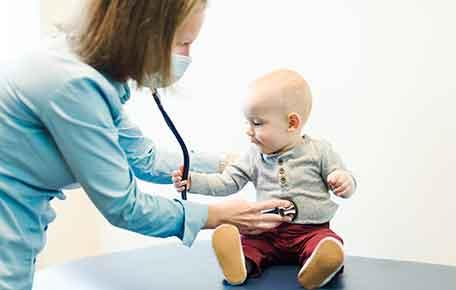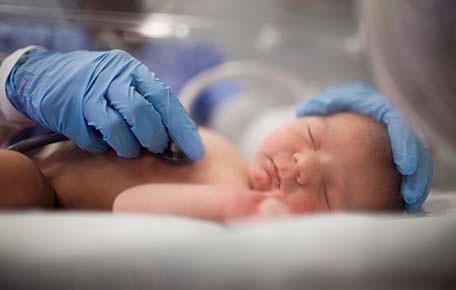Pediatric ECMO
Make an Appointment
When a child’s heart and lungs are unable to work properly, extracorporeal membrane oxygenation (ECMO) can save their life. But it can be very scary to see your child hooked up to an ECMO machine.
Understanding ECMO can help you process this difficult moment. It’s important to remember that your doctor wouldn’t have put your child on ECMO unless they thought they could recover.
UVA Health Children’s & ECMO
It’s hard to find comfort when your child needs ECMO. It’s a serious life-support measure. As one of the few children's hospitals in the region to offer ECMO, UVA Health Children's is very familiar with this treatment. With Pegasus, we can transfer patients from around the state to come here for ECMO life-support.
We’ve been using ECMO since 1991 to save the lives of patients of all ages. Our ECMO program has earned the Platinum Level Center of Excellence award, an honor given to fewer than 30 hospitals worldwide.
What Is ECMO?
ECMO is a machine that takes the place of your child’s heart and lungs. Blood is pumped through the ECMO system the same way it would be pumped through the heart. And just like your child’s lungs would do, the machine removes carbon dioxide and adds oxygen.
ECMO isn’t a treatment. But it gives your child’s heart and lungs time to recover. It can also give other treatments time to work.
Why Would My Child Need ECMO?
Children need ECMO for a variety of reasons. Some of the most common we see:
- Hypoplastic Left Heart Syndrome (HLHS)
- Respiratory Distress Syndrome (RDS)
- Heart failure
- Pneumonia
- Covid-19
- Sepsis
- Meconium aspiration
Types of ECMO
There are two types of ECMO.
Veno-Venous (VV) ECMO supports the lungs. It's used for children who have respiratory distress syndrome or respiratory failure.
Veno-Arterial (VA) ECMO supports both the heart and lungs. It's usually used in children who have heart failure. In this type of ECMO, your child's blood will bypass their heart and lungs entirely.
ECMO FAQs
What Does ECMO Look Like?
Many parents are surprised by the number of tubes and wires that ECMO requires. Many of these wires are for monitors, that help your child's medical team understand their condition. You may also see a breathing tube that helps your child breathe. ECMO also requires large IVs, called cannulas.
Your child may look swollen at first. This is normal with ECMO, and usually gets better with time.
What Will My Child Be Like on ECMO?
Babies and children who need ECMO will usually need to be sedated. That means most of the time they’ll be sleeping. This keeps the ECMO machine in place and it lets their body rest while they wait for treatment, a transplant, or procedure.
But having their parents close by is still a source of comfort. We encourage you to stay with your child while they’re on ECMO.
How Long Will My Child Be on ECMO?
A child can stay on ECMO for days or even weeks, depending on how severe their condition is.
Is ECMO Painful?
The nurses in the PICU and NICU are experienced at noticing pain. They will give your child medicine that helps with pain as needed. But if you see something that makes you think your child is experiencing pain, please let their nurse know.
Can I Breastfeed While My Child Is On ECMO?
Most babies who are on ECMO are given nutrients via IV. This allows your child's medical team to provide the nutrients they'll need while on ECMO, which can differ from those of a healthy child. But that doesn't mean you can't provide breast milk. Ask your nurse about bringing in pumped breastmilk. This will help maintain supply and can be offered as soon as your child's medical team agree they can handle food.
Who Can Visit a Child on ECMO?
Parents are encouraged to visit as often as they're able. Holding your child's hand and talking to them are both comforting measures. Ask about being one of your child's Care Partners. This will make it easier to get updates regularly on their condition.
You can also bring visitors who adhere to the visiting policy of the unit. This can include other relatives or spiritual advisors. If you're far from home and don't have a spiritual advisor locally, UVA Health Chaplains can help you find someone or offer support.
Recovering From ECMO
Your child's heart and lung function will be carefully monitored by their care team while they're on ECMO. When they begin to see signs of improvement, they'll wean your child off of ECMO. Even after they're completely off the machine, they'll need to stay in the ICU until their heart and lung function is stable and they can eat.
We won't discharge your child home until we're sure they're ready.
- Comfort & PlayLearn About the Child Life Program
The hospital can be an overwhelming and scary place to a little child. Our Child Life specialists use play to help your child understand and cope with treatment.
- What Happens Next?See Our Parent Guide
You have questions. You're facing so many unknowns. Get an overview of what to expect as you prepare for your child's heart surgery and beyond.
- Get SupportFind Support
You feel confident in your child's medical care. Now you have to figure out the details of where to stay and how to pay the bills. Find support for logistics and self-care.

Nationally Ranked in Pediatric Cardiology
At UVA Health Children's, we have one of the best cardiology and heart surgery programs for children in the nation according to U.S. News & World Report.


